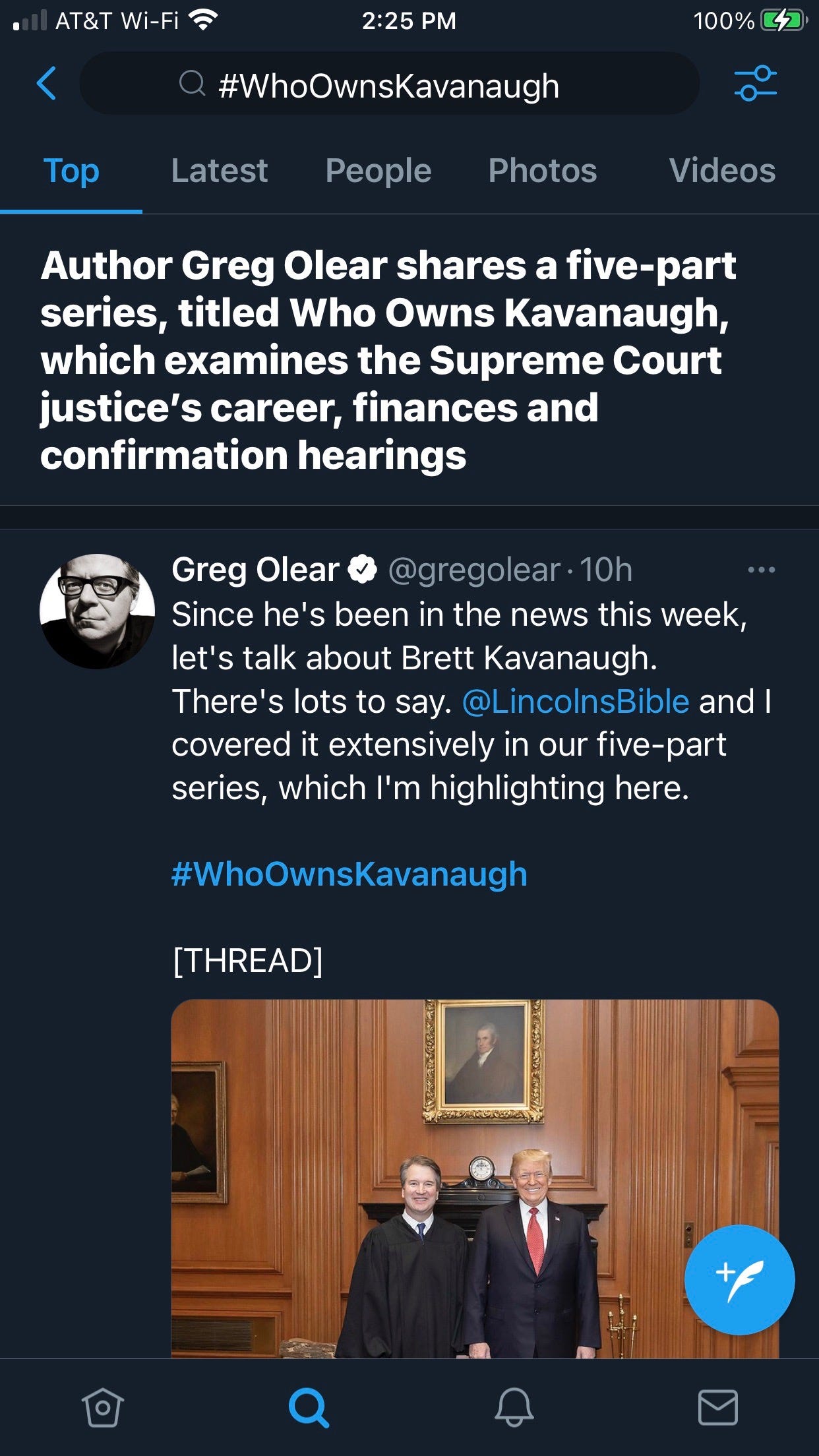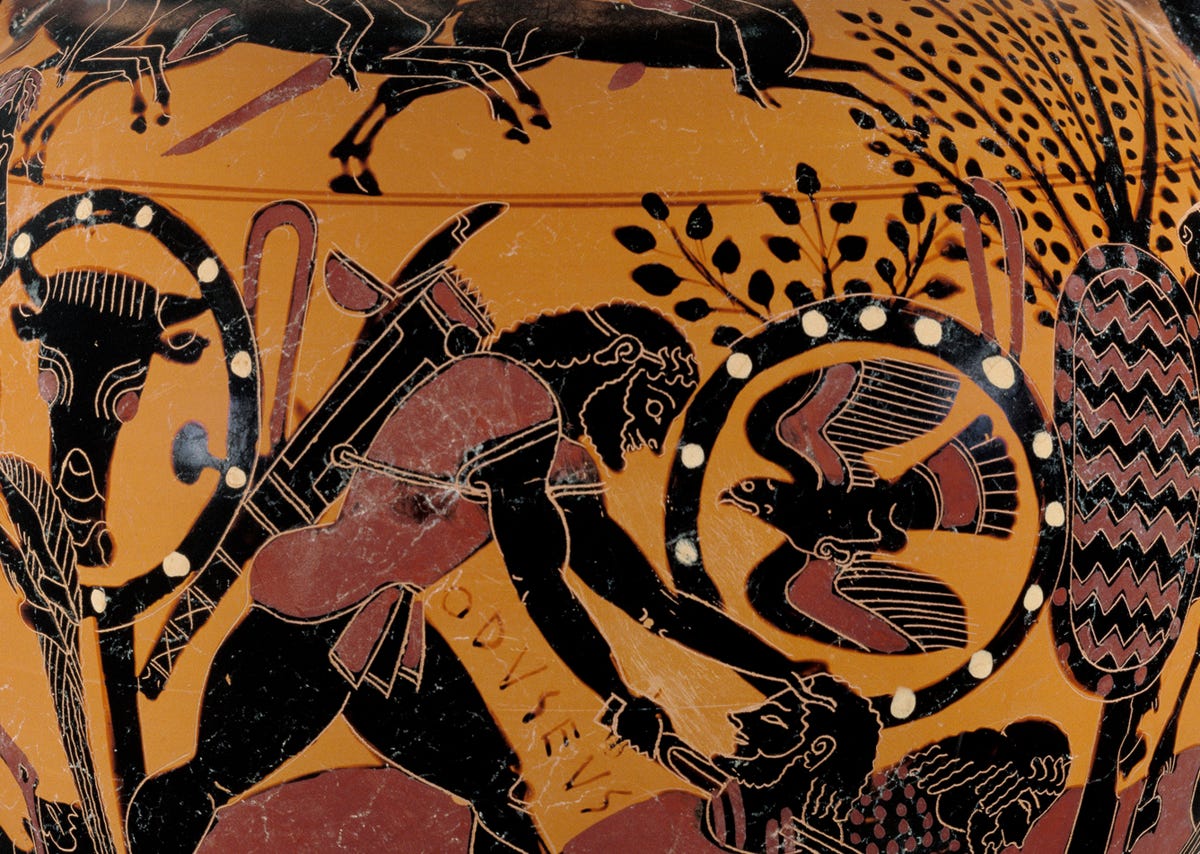Dear Reader,
Yesterday we went to a party—a 50th birthday party for a friend of ours, whom we had not seen for two years on account of quarantine. We didn’t know most of the other guests, which meant we were free to roam around the lovely grounds, explore the pond and the gazebo, swim in the pool, partake of the delicious food and drinks, play with the many dogs in attendance, and take a spin in the gleaming new golf cart that was our friend’s surprise birthday present, enjoying the perfect summer day, without suffering too much from social anxiety. When was the last time we went to a party? It felt reassuringly normal.
As this was happening, the Brett Kavanaugh thread I’d written that morning on Twitter was exploding. The #WhoOwnsKavanaugh hashtag “trended” all afternoon—so much so that the Twitter folks summarized the content of my thread:
This is unlikely to recur. And I’m so grateful that it happened for this thread, highlighting this important series that I wrote with my dear friend Lincoln’s Bible. Because there is a level of public pressure that will compel the Biden Administration and/or Congress to act to remove this hideous wart on the nose of our judicial system. We may never get there, but we have to keep trying. Thanks to all of you who helped spread the word. (And to those new subscribers, welcome to PREVAIL!)
For this week’s “Sunday Pages,” I present the full text of “Ulysses,” by Alfred, Lord Tennyson—the only writer I know who has a comma in his name. (I’ve shared the end of the poem before, as I used it as an opening quote to Dirty Rubles.)
“Ulysses” is about the eponymous hero—Odysseus in Greek—who at the tail-end of his illustrious career seeks one final challenge, one last hurrah before he sails away forever. He is restless in his retirement, an “idle king” not content to rest on his laurels. “How dull it is,” he laments, “to pause, to make an end / To rust unburnish’d, not to shine in use!” He wants to again be useful, to perform “work of noble note…Not unbecoming men that strove with Gods.” The pride of the lion in winter!
I became aware of the poem while working my first job after college—assistant to the video librarian at Young & Rubicam, the storied ad agency. In the mid 90s, Y&R made a series of commercials for Union Bank of Switzerland, in which really great actors did really great dramatic readings of really great poems (a wonderful use of the bank’s ad budget, it says here!). Here is the really great John Gielgud, getting his Tennyson on:
If that doesn’t stir the blood, I don’t know what will! “Ulysses” was also a favorite of the brothers Kennedy—although it’s tough to top Gielgud’s reading.
Enjoy the rest of the weekend, my friends!
Ulysses, by Alfred, Lord Tennyson
It little profits that an idle king,
By this still hearth, among these barren crags,
Match’d with an aged wife, I mete and dole
Unequal laws unto a savage race,
That hoard, and sleep, and feed, and know not me.
I cannot rest from travel: I will drink
Life to the lees: All times I have enjoy’d
Greatly, have suffer’d greatly, both with those
That loved me, and alone, on shore, and when
Thro’ scudding drifts the rainy Hyades
Vext the dim sea: I am become a name;
For always roaming with a hungry heart
Much have I seen and known; cities of men
And manners, climates, councils, governments,
Myself not least, but honor’d of them all;
And drunk delight of battle with my peers,
Far on the ringing plains of windy Troy.
I am a part of all that I have met;
Yet all experience is an arch wherethro’
Gleams that untravell’d world whose margin fades
For ever and forever when I move.
How dull it is to pause, to make an end,
To rust unburnish’d, not to shine in use!
As tho’ to breathe were life! Life piled on life
Were all too little, and of one to me
Little remains: but every hour is saved
From that eternal silence, something more,
A bringer of new things; and vile it were
For some three suns to store and hoard myself,
And this gray spirit yearning in desire
To follow knowledge like a sinking star,
Beyond the utmost bound of human thought.
This is my son, mine own Telemachus,
To whom I leave the scepter and the isle—
Well-loved of me, discerning to fulfil
This labor, by slow prudence to make mild
A rugged people, and thro’ soft degrees
Subdue them to the useful and the good.
Most blameless is he, centred in the sphere
Of common duties, decent not to fail
In offices of tenderness, and pay
Meet adoration to my household gods,
When I am gone. He works his work, I mine.
There lies the port; the vessel puffs her sail:
There gloom the dark, broad seas. My mariners,
Souls that have toil’d, and wrought, and thought with me—
That ever with a frolic welcome took
The thunder and the sunshine, and opposed
Free hearts, free foreheads—you and I are old;
Old age hath yet his honor and his toil;
Death closes all: but something ere the end,
Some work of noble note, may yet be done,
Not unbecoming men that strove with Gods.
The lights begin to twinkle from the rocks:
The long day wanes: the slow moon climbs: the deep
Moans round with many voices. Come, my friends,
’Tis not too late to seek a newer world.
Push off, and sitting well in order smite
The sounding furrows; for my purpose holds
To sail beyond the sunset, and the baths
Of all the western stars, until I die.
It may be that the gulfs will wash us down:
It may be we shall touch the Happy Isles,
And see the great Achilles, whom we knew.
Tho’ much is taken, much abides; and tho’
We are not now that strength which in old days
Moved earth and heaven, that which we are, we are;
One equal temper of heroic hearts,
Made weak by time and fate, but strong in will
To strive, to seek, to find, and not to yield.
Photo credit: Odysseus slaying a Thracian Warrior. Chalkidian Black-Figure Neck Amphora / Storage Jar with Diomedes and Odysseus; Attributed to the Inscription Painter (Greek, active 570 - 530 BCE); Rhegion, South Italy.






Somehow, the older I get, the better Tennyson gets. A wonderful choice! Thank you, Greg!
Great, great poem. Also the mention of Y&R grabbed my attention. My father ran the PR division of the Rochester, New York office. The pandemic has given me the opportunity to go through his papers personal and business. One discovery was the letters his father wrote home to his mother from France during World War I and the fledgling Spanish Flu pandemic. One line that pierced me through the heart was “I pray nothing happens to you. My grandfather made it back to the Catskills
but died two months after my father was born in 1925.